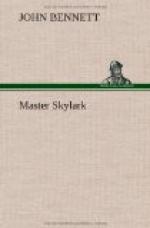He had twelve boys who could sing a hundred songs at sight from unfamiliar notes; who kept the beat and marked the time as if their throats were pendulums; could syncopate and floriate as readily as breathe. And this was only a common country song.
But—“That voice, that voice!” he panted to himself: for old Nat Gyles was music-mad; melody to him was like the very breath of life. And the boy’s high, young voice, soft as a flute and silver clear, throbbed in the air as if his very heart were singing out of his body in the sound. And then, like the skylark rising, up, up it went, and up, up, up, till the older choristers held their breath and feared that the vibrant tone would break, so slender, film-like was the trembling thread of the boy’s wild skylark song. But no; it trembled there, high, sweet, and clear, a moment in the air; and then came running, rippling, floating down, as though some one had set a song on fire in the sky, and dropped it quivering and bright into a shadow world. Then suddenly it was gone, and the long hall was still.
The old precentor stepped beyond the screen.
Gaston Carew’s face was in his hands, and his shoulders shook convulsively. “I’ll leave thee go, lad,_—ma foi_, I’ll leave thee go. But, nay, I dare not leave thee go!”
Some one came and tapped him on the shoulder. It was the sub-precentor. “Master Gyles would speak with thee, sir,” said he, in a low tone, as if half afraid of the sound of his own voice in the quiet that was in the hall.
Carew drew his hand hastily over his face, as if to take the old one off and put a new one on, then arose and followed the man.
[Illustration: “‘THAT VOICE, THAT VOICE,’ NAT GYLES PANTED TO HIMSELF.”]
The old precentor stood with his hands still clasped against his breast. “Mirabile!” he was saying with bated breath. “It is impossible, and I have dreamed! Yet credo—I believe—quia impossibile est—because it is impossible. Tell me, Carew, do I wake or dream—or, stay, was it a soul I heard? Ay, Carew, ’twas a soul: the lad’s own white, young soul. My faith, I said he was of no account! Satis verborum—say no more. Humanum est errare—I am a poor old fool; and there’s a sour bug flown in mine eye that makes it water so!” He wiped his eyes, for the tears were running down his cheeks.
“Thou’lt take him, then?” asked Carew.
“Take him?” cried the old precentor, catching the master-player by the hand. “Marry, that will I; a voice like that grows not on every bush. Take him? Pouf! I know my place—he shall be entered on the rolls at once.”
“Good!” said Carew. “I shall have him learn to dance, and teach him how to act myself. He stays with me, ye understand; thy school fare is miserly. I’ll dress him, too; for these students’ robes are shabby stuff. But for the rest—”
“Trust me,” said Master Gyles; “he shall be the first singer of them all. He shall be taught—but who can teach the lark its song, and not do horrid murder on it? Faith, Carew, I’ll teach the lad myself; ay, all I know. I studied in the best schools in the world.”




